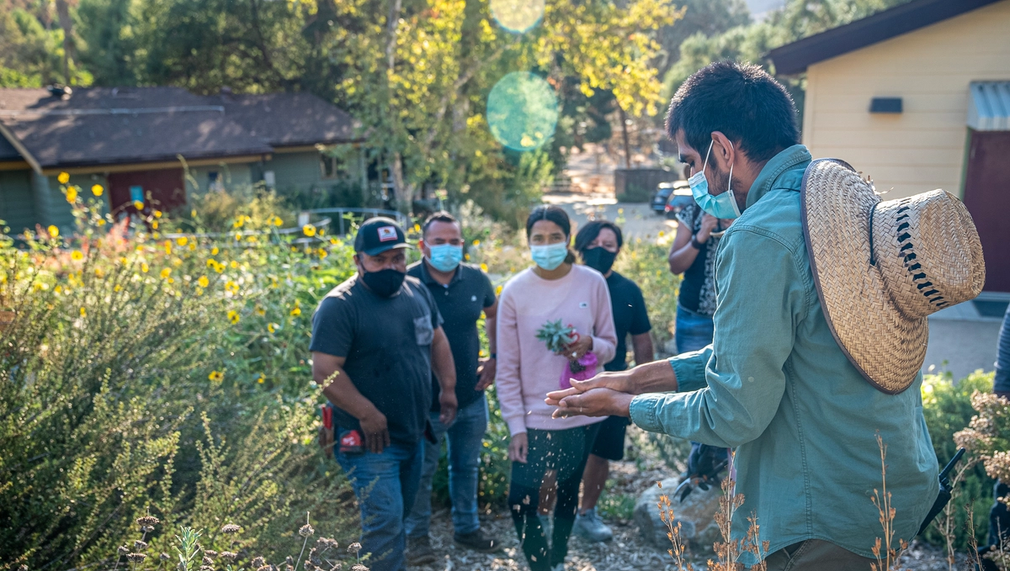Climate-Ready Native Plant Landscaper Training
Our California Native Plant Landscaper Certificate Program (CNPLC) is a bilingual (English and Spanish) job-training program for landscape professionals developed and taught by California’s leading native plant experts. By providing this training to landscapers, we help grow independent businesses while enabling residents of Los Angeles County to save water, restore habitats, and bring the unique beauty of the natural world into our towns, cities, and homes.

What is the primary issue area that your application will impact?
Climate and Environment
In which areas of Los Angeles will you be directly working?
Central LA
East LA
San Gabriel Valley
San Fernando Valley
South LA
West LA
South Bay
Antelope Valley
County of Los Angeles
City of Los Angeles
In what stage of innovation is this project, program, or initiative?
Expand existing project, program, or initiative
What is your understanding of the issue that you are seeking to address?
As Southern Californians begin to opt for more drought-resilient, climate-friendly landscapes, the need for a knowledgeable landscaper workforce is greater than ever. However, many professionals in the industry do not yet possess the specialized knowledge to plant and care for native plants and California friendly gardens. Environmentally friendly gardens will not be adopted by the public until Los Angeles has a body of professionals who are adequately equipped to manage them and keep them looking beautiful. Our ten-part curriculum addresses key components of sustainability and gives landscape practitioners the tools and information they need to successfully maintain water-conserving gardens. This hones in on the potential that residential and commercial landscapes in Los Angeles have to save water, restore habitat and create resilience in the face of a growing population and an uncertain climate future.
Describe the project, program, or initiative this grant will support to address the issue.
With the generous support of the Los Angeles Department of Water and Power (LADWP) Community Partnerships program, and in partnership with CNPS and the US Green Building Council, LA we officially launched the CNPLC in the summer of 2020. During the one year pilot phase, the course was offered in Spanish and English, with priority given to sole proprietor businesses. To date, over 400 landscape professionals have completed the certification program. Interest in the program shows no signs of stopping; over the next twelve months, we expect another 200 individuals will complete this program. As the demand for this program grows, so do our needs for staffing and infrastructure to complete more trainings and support program alumni. See education.theodorepayne.org for more information.
Describe how Los Angeles County will be different if your work is successful.
With this program we have the opportunity to make significant and impactful changes to our landscape, which can preserve the unique ecology of Southern California while saving water and reducing the use of chemicals, plastic, and non-renewable resources in the urban environment. At the same time, we can lift up workers in the landscape industry, giving them new skills and access to a new clientele. When our work is implemented, neighborhoods are transformed from stretches of sterile lawn and concrete to bustling habitats that support valuable biodiversity, feed pollinators, sequester carbon, and conserve water and other resources.
What evidence do you have that this project, program, or initiative is or will be successful, and how will you define and measure success?
Using post-program student surveys, we measure the success of the program directly from participant feedback. According the survey, students found classes pertaining to the business side of landscaping was most informative, followed by classes on soils, plant identification, and pruning. Students also indicated that the in-person practicums were invaluable. Students also reported that our workbook was very useful, and 92% of respondents said that they would or would likely use it in the field. We plan to continue tracking the success of program alumni with ongoing surveys. The success of BIPOC and women alumni in particular has been reported on in press including Spectrum News 1, La Opinión, and Telemundo. This program was also the recipient of the US Green Building Council LA’s Community Impact Award for 2021.
Approximately how many people will be impacted by this project, program, or initiative?
Direct Impact: 200
Indirect Impact: 10,000